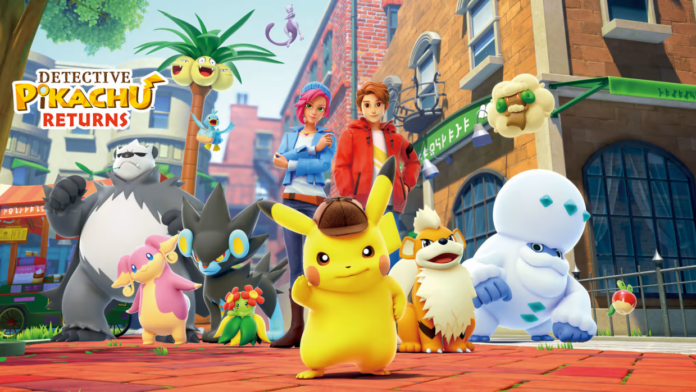Detective Pikachu has certainly had a strange history. Starting with a Japan-exclusive 3DS demo “Birth of a New Duo” in February 2016, the unprecedented Pokémon spin-off, starring a wise-cracking, crime-solving, caffeine-addicted Pikachu, didn’t get a proper worldwide release until over two years later. The lengthy delay for localization was likely so the release of the game would more closely coincide with the live-action theatrical feature film adaptation that was in active development at Legendary Pictures. Just a few weeks after the movie premiered in May 2019, The Pokémon Company announced that a sequel to the original game was in the works for Nintendo Switch. After four years of radio silence regarding the project, Detective Pikachu Returns was formally revealed earlier this year. Now that the sequel is finally here, it’s time to find out… was it really worth the wait? Let’s solve the case!
Detective Pikachu Returns’ story takes place approximately two years after the events of the first game. In case you haven’t played the 3DS predecessor, the sequel begins with Pikachu providing the player with a quick summary of the journey thus far, continuing the unsolved mystery of the missing detective Harry Goodman, Pikachu’s former partner and the father of the main protagonist, detective Tim Goodman. After the recap, we flash forward to the present where the mayor of Ryme City, Howard Myers, is formally declaring the start of “Pokémon Friendship Week.” While presenting Tim and Pikachu with an award for their past detective efforts, the ceremony is suddenly interrupted by an unusually aggressive Corviknight. This is where your adventure begins; one filled with twists, turns, and plenty of case-cracking detective work in the Pokémon universe.

There are six total chapters in the game, including the prologue. Each chapter has a different mystery that needs to be solved, but there is an overarching narrative that slowly starts to come together as you progress through the story. Strangely enough, there is a “Story Jump Mode” on the main menu that becomes available once you finish the prologue. This mode allows you to play the chapters in any order, but I have no idea why you would want to do that considering the mostly linear storytelling nature of the game. Nevertheless, the option is there if for some reason one of the chapters interests you more than another.
As for the story itself, the characters in the game are what really make Detective Pikachu Returns worth your time. The writing can be quite humorous (sometimes intentional, sometimes not) and the fully voice-acted cutscenes really help make the loveable cast of characters, both new and old, come to life. English and Japanese vocals/subtitles can be swapped between in the settings, with Kaiji Tang and Khoi Dao reprising their English roles as Detective Pikachu and Tim Goodman respectively. Pikachu himself is definitely the highlight of the bunch with his gruff and sarcastic yet determined and caring personality. One moment I found to be particularly entertaining was when he had a deep memory-restoring flashback after eating a spoonful of mac and cheese. Unfortunately, most of the plot twists are quite predictable fairly early on, some of which are even reused and/or slightly altered story elements from the 2019 movie. There are enough unique aspects to make up for it, but just barely.
Even though Detective Pikachu Returns is heavily reliant on its story and character interaction, it’s not a visual novel in the traditional sense, as the heart and soul of the game is supposed to make you feel like you’re a detective. While some of the gameplay ideas it presents are interesting, they aren’t explored in-depth enough and fail to reach their maximum potential. The gameplay consists mostly of freely exploring around Ryme City, talking to people and Pokémon (with Pikachu acting as a translator) to gain clues about your investigation. Testimonies and evidence that you gather are put into a notebook, and once enough information is learned, you can begin deducing by selecting from multiple choice options to help solve the case. It’s a perfectly fine mechanic, but common sense and basic reading comprehension are really the only necessary tools that you need to progress. Furthermore, there is no actual punishment for getting an answer wrong, so you can simply select the options one by one until you get it right. A better incentive to pay more attention would have gone a long way for engagement.


There are a few other gameplay mechanics sprinkled throughout the game, but all of them require virtually no real effort in thought or skill. The puzzles are extremely simple, tasking you with things like pushing a rock forward to create a pathway, playing a point-and-click hidden object minigame, following a scent trail, or mashing the A button as fast as you can. The most difficult part is the stealth sections, but even those are as easy as moving forward when the enemy isn’t looking. There are also some optional side-quests to discover around the city, but they don’t really amount to much and feel more like a chore than anything. It’s obvious that Detective Pikachu Returns was made with a younger audience in mind, and that’s not a bad thing per se, but if you’re looking for a challenge, you won’t find it here. But for what it’s worth, there is a great deal of wholesome Pokémon adorableness throughout the 10-15 hour experience. Is that a fair trade off? That’s for you to decide.
Creatures Inc., the co-owners of the Pokémon IP responsible for most of the 3D character modeling in the mainline games and spin-offs, are the lead developers of Detective Pikachu Returns. Known for solo-developing the Pokémon Ranger (DS) and PokéPark (Wii) series, as well as, of course, Detective Pikachu on 3DS, Detective Pikachu Returns is technically Creatures’ first solo project that they’ve developed for a high-definition home console. Even considering that the Nintendo Switch is nearly seven years old at this point, it’s hard to overlook some of the glaring graphical issues that are present.


Although the framerate is mostly stable and load times are snappy enough, cutscenes have some weird artifacting, animations are stiff and awkward in some instances, and the visuals are a pretty decent downgrade from other Pokémon games on Switch, including New Pokémon Snap and Pokémon Tournament DX (both of which were developed by Bandai Namco). The best way to describe the graphics of Detective Pikachu Returns is that it looks and feels like an upscaled 3DS game. It’s far from being anything horrible, but it’s definitely not anything to write home about either. The simplistic cartoony style admittedly does have its occasional screenshot worthy moments, but the majority of the time it’s visually passable and nothing more.
Unless you’re a Pokémon fan that loves to read and are looking for something easy to play casually, Detective Pikachu Returns unfortunately doesn’t have too much to offer outside of charm. While the game does have some interesting interactive elements, it focuses more on story rather than having super engaging gameplay. It’s clear that a lot of love and care was put into the narrative and character dialogue, but the decision to rehash certain plot elements from the movie gave a strange sense of deja vu and made some of the twists feel less impactful. If for some reason you haven’t seen the movie though, I recommend playing Detective Pikachu Returns beforehand, as you’re likely to gain a lot more from the overall experience by doing so. Otherwise, it’s difficult to fully recommend this sequel that doesn’t quite live up to the quality of the 3DS original.
6/10
A copy of Detective Pikachu Returns for review purposes was provided by Nintendo UK.
Related
mynintendonews.com



![Nintendo says that “we will continue to release info [about next console] in phases” Jeff Grubb thinks that a Nintendo Direct “is almost certainly going to happen in February”](https://sportominal.com/wp-content/uploads/sites/8/2024/01/nintendo_logo_red1-218x150.png)



